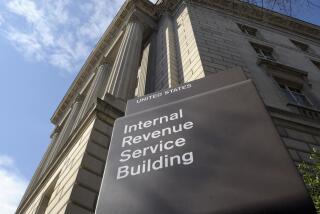But Agency’s ‘Assisters’ Could Use Some Help : Taxpayers Prove Smarter Than IRS Expected
- Share via
WASHINGTON — With a Friday midnight deadline in sight, taxpayers are having less trouble with the new federal tax law than had been expected, government auditors said Wednesday.
Filers are making fewer mistakes than expected and asking fewer questions of the IRS than had been anticipated. And they are not running in droves to professionals to do their returns.
Chances of getting the correct answer to your tax questions from the Internal Revenue Service have improved slightly, but the agency’s telephone “assisters” are still giving the wrong answers to 279 of every 1,000 queries, IRS Commissioner Lawrence B. Gibbs told the House Ways and Means oversight subcommittee.
Gibbs and Rep. J. J. Pickle (D-Texas) agreed that is too many errors. “You get better odds in Las Vegas,” Pickle said.
More Wrong Answers
“We must and will improve our accuracy rate for our customers,” Gibbs promised. He mentioned plans to make assisters full-time, rather than seasonal, employees; to raise their pay, and to give each immediate access to the computerized information necessary to answer questions.
Despite that disappointing problem, he said, “All in all, the filing season has proceeded very smoothly.”
The General Accounting Office, the investigative arm of Congress, also was generally satisfied with the way the IRS has handled this filing season. But GAO found the agency giving even more wrong answers to telephoned questions than did the check run by the IRS.
- GAO made 1,523 calls to IRS assisters and got the correct answers 62% of the time. That’s compared to 61% in February, said Johnny C. Finch, deputy director of GAO.
- IRS, with a much broader sampling, made 15,000 calls and got the right answer 72.1% of the time. In February, the agency claimed 74.8% accuracy, but Gibbs said Wednesday that the IRS, in consultation with GAO, had changed its test-call system, resulting in adjustment of the February accuracy rate to 70.7%. Thus, the figure reported Wednesday is better than for February.
Through April 8, the IRS had received 64.5 million returns, compared to 65.7 million before the last week of the 1987 filing season. The agency has processed 52.7 million this year, down slightly from 52.8 million at this time last year.
Refunds have been certified for 78% (41 million) of the returns that have been processed, compared to 79% at this time last year. Refunds are averaging $830, up from $815.
Gibbs said the IRS had expected many more problems than it has encountered this year because the far-reaching tax law enacted in 1986 is being felt for the first time on returns filed this year.
The subcommittee was told that:
- The IRS has received 15.7 million telephone calls for information this year, up 12.6% from last year but 7.8% fewer than expected.
- About 42% of the returns filed so far have been prepared by professionals, up from 40% last year but less than in 1986. Some experts had predicted most taxpayers would have to turn to professionals because of the new law.
- Errors are showing up on 20.7% of returns, about 1.4 percentage points above last year. “Although IRS expected that error rates would increase as taxpayers and returns processing staff adjusted to changes in tax forms and filing requirements, the amount of the increase has been less than expected,” Finch said.
- Because several itemized deductions have been eliminated or reduced while the standard deduction has been increased, the number of couples and individuals who itemize has dropped. Only 48% of those who have filed the long form, 1040, have itemized this year, down from 60% a year ago.
Forms Easier for Some
In sampling returns filed at one of the 10 IRS service centers, GAO found that 14.1% of those who had filled out the long form could have used the shorter 1040A or the one-page 1040EZ. The shorter forms are easier to prepare and to process.
More to Read
Inside the business of entertainment
The Wide Shot brings you news, analysis and insights on everything from streaming wars to production — and what it all means for the future.
You may occasionally receive promotional content from the Los Angeles Times.










